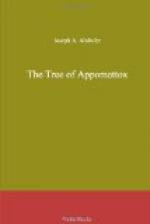Dick, searching his own mind, concluded it was the chief reason with him, although he, too, was eager enough for a more spacious life than that of the trench.
“I’m going to wish so hard for it,” said Pennington, “that it’ll come true.”
Whether Pennington’s wish had any effect or not, they departed two days later, three mounted regiments under the general command of Hertford, his right as a veteran cavalry leader. All regiments, despite new men, had been reduced greatly by the years of fighting, and the three combined did not number more than fifteen hundred horse. But there was not one among them from the oldest to the youngest who did not feel elation as they rode away on the great curve that would take them into the Valley of Virginia.
“It’s glorious to be on a horse again, with the world before you,” said Pennington. “I was born horseback, so to speak, and I never had to do any walking until I came to this war. The great plains and the free winds that blow all around the earth for me.”
“But you don’t have rivers and hills and forests like ours,” said Dick.
“I know it, but I don’t miss them. I suppose it’s what you’re used to that you like. I like a horizon that doesn’t touch the ground anywhere within fifteen or eighteen miles of me. And think of seeing a buffalo herd, as I have, that’s all day passing you, a million of ’em, maybe!”
“And think of being scalped by the Sioux or Cheyennes, as your people out there often are,” said Warner.
Pennington took off his cap and disclosed an uncommonly thick head of hair.
“You see that I haven’t lost mine yet,” he said. “If a fellow can live through big battles as I’ve lived through ’em he can escape Sioux and Cheyennes.”
“So you should. Look back now, and you can see the armies face to face.”
They were on the highest hill, and all the cavalry had turned for a last glance. Dick saw again the flashes from occasional rifle fire, and a dark column of smoke still rising from a spot which he knew to be the crater. He shuddered, and was glad when the force, riding on again, passed over the hill. Before them now stretched a desolated country, trodden under foot by the armies, and his heart bled again for Virginia, the most reluctant of all the states to secede, and the greatest of them all to suffer.
Colonel Hertford, Colonel Winchester, and the colonel of the third regiment, a Pennsylvanian named Bedford, rode together and their young officers were just behind. All examined the country continually through glasses to guard against ambush. Stuart was gone and Forrest was far away, but they knew that danger from the fierce riders of the South was always present. Just when the capital seemed safest Early’s men had appeared in its very suburbs, and here in Virginia, where the hand of every man and of every woman and child also was against them, it was wise to watch well.




